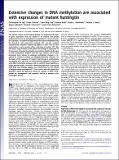Extensive changes in DNA methylation are associated with expression of mutant huntingtin
Author(s)
Ng, Christopher W.; Yildirim, Ferah; Yap, Soon Ming Micha; Matthews, Bryan; Velez, Patricio J.; Labadorf, Adam; Fraenkel, Ernest; Dalin, Simona; Housman, David E; ... Show more Show less
DownloadNg-2013-Extensive changes in.pdf (1.285Mb)
PUBLISHER_POLICY
Publisher Policy
Article is made available in accordance with the publisher's policy and may be subject to US copyright law. Please refer to the publisher's site for terms of use.
Terms of use
Metadata
Show full item recordAbstract
The earliest stages of Huntington disease are marked by changes in gene expression that are caused in an indirect and poorly understood manner by polyglutamine expansions in the huntingtin (HTT) protein. To explore the hypothesis that DNA methylation may be altered in cells expressing mutated HTT, we use reduced representation bisulfite sequencing (RRBS) to map sites of DNA methylation in cells carrying either wild-type or mutant HTT. We find that a large fraction of the genes that change in expression in the presence of mutant huntingtin demonstrate significant changes in DNA methylation. Regions with low CpG content, which have previously been shown to undergo methylation changes in response to neuronal activity, are disproportionately affected. On the basis of the sequence of regions that change in methylation, we identify AP-1 and SOX2 as transcriptional regulators associated with DNA methylation changes, and we confirm these hypotheses using genome-wide chromatin immunoprecipitation sequencing (ChIP-Seq). Our findings suggest new mechanisms for the effects of polyglutamine-expanded HTT. These results also raise important questions about the potential effects of changes in DNA methylation on neurogenesis and cognitive decline in patients with Huntington disease.
Date issued
2013-01Department
Massachusetts Institute of Technology. Department of Biological Engineering; Massachusetts Institute of Technology. Department of BiologyJournal
Proceedings of the National Academy of Sciences
Publisher
National Academy of Sciences (U.S.)
Citation
Ng, C. W., F. Yildirim, Y. S. Yap, S. Dalin, B. J. Matthews, P. J. Velez, A. Labadorf, D. E. Housman, and E. Fraenkel. “Extensive changes in DNA methylation are associated with expression of mutant huntingtin.” Proceedings of the National Academy of Sciences 110, no. 6 (February 5, 2013): 2354-2359.
Version: Final published version
ISSN
0027-8424
1091-6490